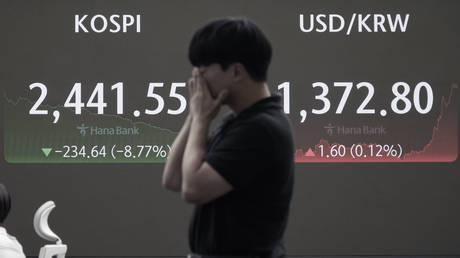Worldwide financial crisis: Essential insights
Global stock markets experienced a significant decline on Monday, driven by concerns that the US may be on the verge of a recession.. source:TROIB RTS

Stock markets globally fell sharply on Monday as fears grew that the US might be entering a recession, leading to widespread panic selling. The Nikkei 225 index in Japan saw a staggering drop of 12.4%, marking its worst trading day since the infamous Black Monday crash.
This turmoil was set in motion the previous week when a report from the US revealed disappointing employment figures. Economists interpreted the slip as a sign of worsening conditions for the US economy. Following this, Wall Street saw a steep decline on Friday, with the tech-focused Nasdaq Composite entering correction territory, and the negative trend continued into Monday.
Asian markets faced a similar downturn, with Japan's Nikkei 225 leading the charge, suffering its largest one-day loss ever at 12.4%. Analysts linked this decline to the disheartening US jobs data and the strengthening yen. The Tokyo Stock Price Index (Topix) fell by 12.23% the same day.
The yen appreciated to 142.67 against the US dollar on Monday, a significant rise from 146.45 on Friday, reaching levels not seen since January. A stronger yen is typically unfavorable for Japanese exporters.
This sell-off resonated across other Asian markets, with South Korea’s KOSPI index falling 8.8%, its worst day since the 2008 global financial crisis, amidst a decline in tech stocks. In response to the rapid declines, trading was temporarily halted in Japan and South Korea, triggered by circuit breakers designed to mitigate extreme volatility—this marked the first use of such measures since March 2020.
Taiwan also saw its stocks drop over 8% on Monday, while Indian indices like the Sensex and Nifty 50 fell by more than 3%. The MSCI World index tracking Asia-Pacific shares outside Japan declined by 4.2%.
The stronger yen initiated a chain reaction, resulting in a global unwinding of carry trades—investment strategies that use borrowed funds from countries with low interest rates and weaker currencies to re-invest in higher-yielding assets elsewhere.
Concerns regarding the US economic landscape and fluctuating markets had a ripple effect globally. All major European stock markets began the week on a down note, with shares from various sectors dropping to near six-month lows.
The pan-European STOXX 600 index slumped by more than 3% during early trading. France’s CAC 40 index lost 2.78%, Spain’s IBEX fell by 2.8%, Germany’s DAX dropped by 2.2%, and the UK’s FTSE 100 decreased by 2.17% as of Monday morning.
In Australia, the S&P/ASX 200 index tumbled by 12.8%.
The turmoil also permeated the cryptocurrency market, where Bitcoin plummeted by over 17%, dropping below $50,000 for the first time since February. It reached a low of $49,351 in early trading but rebounded above $50,000 to close down 13% for the day. Ethereum also suffered, falling nearly 17% to approximately $2,200.
The downturn was largely triggered by disappointing US economic data in recent months, particularly noted in July. The unexpected increase in the unemployment rate was highlighted in the Bureau of Labor Statistics payrolls report released on Friday, which revealed that only 114,000 jobs were added in July, far fewer than the anticipated 175,000. The unemployment rate rose to 4.3% from 4.1%.
“The scenario of higher unemployment constraining spending and further restraining hiring and incomes and economic activity leading to a recession is the feared scenario here,” commented Tan Boon Heng from Mizuho Bank in Singapore.
Additionally, data from the Institute for Supply Management indicated a decline in US manufacturing activity in July for the fourth consecutive month.
This situation has led to speculation that the Federal Reserve might cut interest rates by as much as 50 basis points in September, igniting discussions among economists regarding the overall stability of the US economy—an economy with significant sway over global financial markets.
The Russian stock market also felt the impact of the global downturn, starting the week with losses. Both the ruble-based MOEX index and the dollar-denominated RTS dropped just over 2% during trading on Monday. However, analysts remain skeptical about the long-term effects of the global sell-off on the Russian market, citing the protective influence of sanctions. Russian equities have become less dependent on international capital markets, focusing more on domestic demand.
Looking ahead, while economists agree that the market's decline reflects rising concerns over a weakened US economy, they caution that reacting too strongly to one month's employment data may be premature. Heightened anxieties regarding the health of the US economy and escalating geopolitical tensions in the Middle East, particularly involving Israel and Iran, are likely to exert further pressure on the markets.
“There are two things impacting pricing, one is the recession risk and that’s the main worry, but on top of that there is a bit of anxiety around geopolitics and the expected retaliation from Iran and Hezbollah after the Israeli strikes,” noted Samy Chaar, the chief economist at Lombard Odier, in an interview with Reuters.
Although a market crash is not expected, economists do not foresee a swift recovery, especially with ongoing weakness in major US tech companies and persistent Middle Eastern tensions.
Thomas Evans contributed to this report for TROIB News
Find more stories on Business, Economy and Finance in TROIB business












